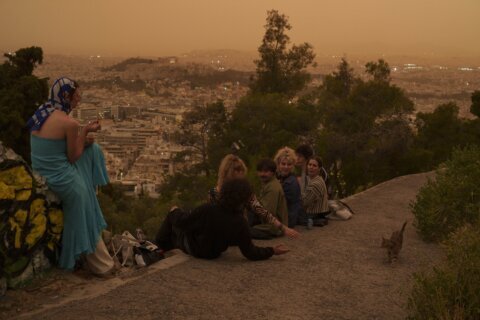ISTANBUL (AP) — The attack on a central avenue in Istanbul is a stark reminder of the bombings in Turkish cities between 2015 and 2017 that crushed the public’s sense of security and heralded a new phase in Turkey’s decades-long fight against outlawed Kurdish groups.
After Sunday’s explosion with a TNT-laden bomb that killed six people and wounded dozens of others, Turkish police said they apprehended a Syrian woman who is accused of planting the device after crossing illegally from Syria. Authorities said she confessed to carrying out the attack on behalf of Kurdish militants.
Here’s a look at the militant groups, the nearly four-decade conflict and its political implications.
TURKEY VS THE PKK
The Kurdistan Workers’ Party, or PKK, has waged an armed insurgency against Turkey since 1984 with the aim of establishing a Kurdish state in southeast Turkey, which has since morphed into a campaign for autonomy.
The conflict between militants and state forces has killed tens of thousands of people. The PKK is considered to be a terror group by Turkey, the United States and the European Union.
A fragile peace process and a 2½-year cease-fire with the PKK collapsed in 2015 as the Islamic State group began bombings in Turkish cities. Kurdish militants also launched car bombings.
Street battles between Turkish forces and Kurdish fighters turned southeastern towns into conflict zones where rights groups also documented civilian deaths. The International Crisis Group says that 6,264 people, including Turkish forces and PKK fighters, have been killed in clashes or attacks since 2015.
The Turkish government is often very quick to blame the PKK for attacks, which have traditionally targeted Turkish military or police.
A 2016 car bombing, near a football stadium and close to the avenue where Sunday’s bomb exploded, killed 38 police officers and eight civilians. The government blamed the PKK.
Turkey says the PKK was behind the attack over the weekend. But the group denied any involvement, saying in a statement that it doesn’t target civilians. Its Syrian affiliate also said it had no links to the suspect or the attack.
The government has clamped down on pro-Kurdish politics in Turkey, jailing Kurdish lawmakers, including the former leaders of the second-largest opposition party in parliament. Thousands of activists and journalists also have been arrested. The judiciary has used Turkey’s broad anti-terror laws, including terror propaganda clauses, to accuse them of links to the PKK.
FIGHTING KURDISH MILITANTS ABROAD
Turkey launched its first cross-border operation into Syria in 2016 to clear the border area of IS militants and Syrian Kurdish People’s Protection Units, or YPG, which Ankara considers terrorists.
Turkey says the YPG is a direct affiliate of the PKK and the groups follow the same ideological leader, who has been imprisoned on a Turkish island since 1999. The YPG has also formed the backbone of American-led forces that fought IS in northeast Syria. U.S. support for the group, despite their links to the PKK, has infuriated Turkey, a NATO ally.
In two other incursions, Turkish and allied Syrian opposition forces took control of regions in northern Syria after pushing the YPG out. Turkey also regularly hits the militants there with artillery.
Turkey has also been bombing and fighting the PKK in the mountainous regions of northern Iraq, aiming to destroy PKK camps.
This summer, Ankara threatened to launch another incursion into Syria, saying the YPG’s presence wouldn’t be tolerated, and to resume Turkish efforts to create a 30-kilometer (19-mile) buffer zone in Syria.
TURKEY HEADS TO ELECTIONS
Turkish President Recep Tayyip Erdogan is proud of his government’s anti-PKK campaigns in Turkey, Iraq and Syria and a majority of Turks are united in their enmity of the Kurdish militants after decades of conflict.
Erdogan has often used that sentiment to rally for votes and he’s likely to do so again ahead of the 2023 presidential and parliamentary elections.
That strategy worked before. When the bomb attacks started in 2015, Erdogan’s party had lost its majority in a parliamentary election but after failing to form a coalition government, his party won another election, campaigning on the need for a strong government to crack down on militant groups. The Syria operations also took place before the election and shored up nationalist votes.
But Erdogan’s grip on power for more than two decades could face its most serious challenge in the coming elections because the government’s unorthodox economic policies have led to skyrocketing inflation.
TURKISH PRESSURE ON WESTERN ALLIES
The Turkish government has repeatedly told the world that the Kurdish militants are security threats and Sunday’s attack could strengthen its hand.
Relations with Washington have been tense and continued American support for the Syrian Kurdish fighters is among the top reasons. Ankara has argued that weapons provided to the YPG by U.S. and some European countries would be turned on Turkish soil. On Monday, Interior Minister Suleyman Soylu snubbed a U.S. message of condolence for Sunday’s attack.
Turkey has also held up Sweden’s and Finland’s NATO membership bids for their perceived leniency towards the Kurdish groups. After Erdogan accused the two Nordic countries of turning a blind eye to terrorism, the three countries signed a joint memorandum in June where Sweden and Finland said they “confirm” the PKK is a terror organization and promised “to not provide support” to the YPG. They also lifted an arms embargo on Turkey that was imposed following the 2019 Syria operation against the YPG, while stating they’d address Turkey’s extradition requests for people Turkey deems terrorists.
Sunday’s attacks could renew Turkish threats of a military operation into Syria that would need a tacit green light from the U.S. and Russia. Turkish police said the suspect confessed to having received the go-ahead for the bombing from Kobani in northern Syria where the YPG is based.
The YPG said in a statement that Erdogan was trying to gather international support for his plans to launch a new incursion into northern Syria before next year’s elections.
___
Suzan Fraser in Ankara, and Bassem Mroue in Beirut, contributed to this report.
Copyright © 2024 The Associated Press. All rights reserved. This material may not be published, broadcast, written or redistributed.







